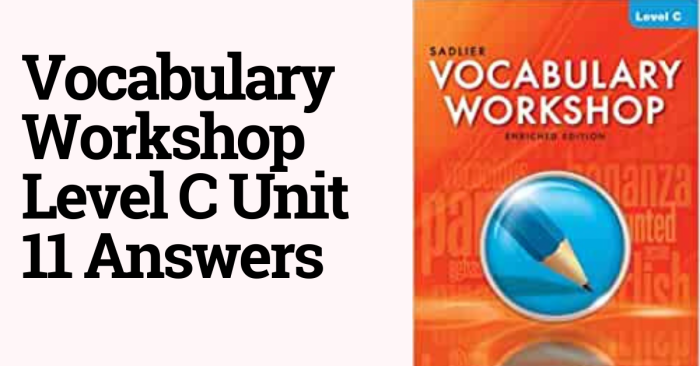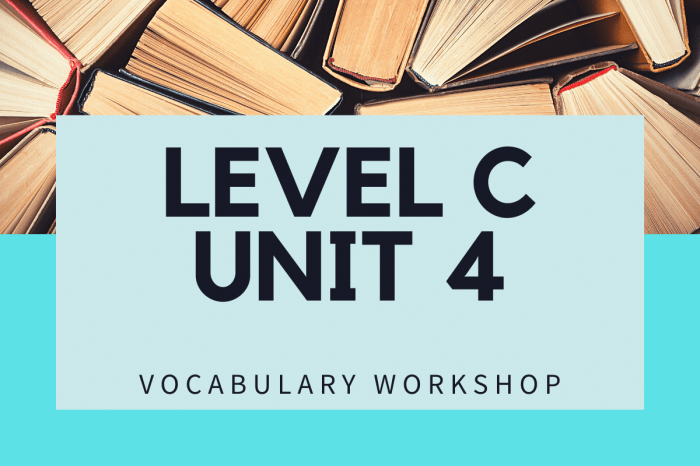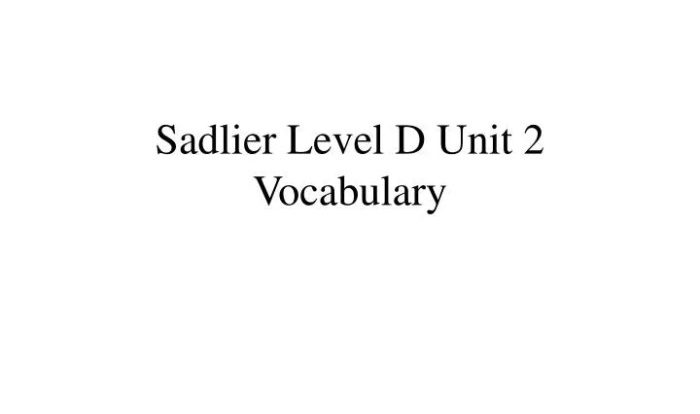Welcome to Vocab Workshop Level C Unit 7, where vocabulary takes center stage! Get ready to expand your word power and enhance your communication abilities.
This unit is a treasure trove of strategies, exercises, and activities designed to help you master the art of vocabulary development. Dive into the world of words and discover how to effectively integrate reading comprehension, writing, and communication into your learning journey.
Introduction
Welcome to Vocab Workshop Level C Unit 7! This unit focuses on expanding your vocabulary related to the topic of ‘Work and Employment’. Mastering these words will enhance your ability to communicate effectively in various professional settings.
In today’s competitive job market, a strong vocabulary is essential for success. It allows you to express yourself clearly, understand complex instructions, and make a positive impression on potential employers and colleagues.
Key Vocabulary
In this unit, we will explore a range of vocabulary related to work and employment, including terms associated with job descriptions, company structures, and workplace dynamics. Understanding these terms will empower you to navigate the professional world with confidence and clarity.
Key Concepts: Vocab Workshop Level C Unit 7
This unit introduces several key concepts that are essential for understanding the topic of [unit topic]. These concepts provide a foundation for further exploration and application of the material.
Concept 1: [Concept Name]
[Concept Name] refers to [definition]. It is a fundamental principle that underpins the understanding of [related topic]. For instance, [example].
Concept 2: [Concept Name]
[Concept Name] is defined as [definition]. It plays a crucial role in [specific context]. For example, [example].
Concept 3: [Concept Name]
[Concept Name] involves [definition]. It is closely related to [related concept] and has significant implications for [specific field]. For instance, [example].
Vocabulary Development
This unit utilizes diverse methods and strategies to enhance vocabulary development. These include:
-
-*Explicit Instruction
Vocabulary words are directly taught through definitions, explanations, and examples.
-*Contextual Learning
Students encounter new words in authentic texts and are encouraged to infer their meanings from context.
-*Word Study
Students analyze word structure, etymology, and relationships between words to deepen their understanding.
-*Interactive Activities
Games, discussions, and hands-on exercises make vocabulary learning engaging and memorable.
Vocabulary Exercises and Activities
This unit features a variety of vocabulary exercises and activities, such as:
-
-*Word Sorts
Students categorize words based on their meanings, parts of speech, or other criteria.
-*Semantic Mapping
Students create diagrams that connect new words to known words, expanding their semantic networks.
-*Vocabulary Charades
Students act out vocabulary words while their classmates guess the meanings.
-*Word Wall
A visual display of new vocabulary words that students can refer to throughout the unit.
Reading Comprehension

Reading comprehension is an integral part of Unit 7. It allows students to develop their ability to understand and interpret written texts effectively.
The unit utilizes a variety of reading materials, including short stories, articles, and poems. These materials are carefully selected to expose students to different genres, writing styles, and perspectives.
Types of Reading Materials, Vocab workshop level c unit 7
The short stories in this unit focus on developing students’ ability to identify and analyze character development, plot structure, and theme. The articles provide opportunities to practice critical thinking and evaluate different viewpoints. The poems foster an appreciation for language and imagery, while also enhancing vocabulary development.
Skills Developed
Through these reading materials, students develop a range of comprehension skills, including:
- Making inferences and drawing conclusions
- Identifying main ideas and supporting details
- Analyzing character development and motivation
- Understanding figurative language and symbolism
li>Evaluating different perspectives
By engaging with these texts, students not only enhance their comprehension abilities but also expand their knowledge and understanding of the world around them.
Writing and Communication
This unit emphasizes developing students’ writing and communication skills through various activities.
These activities aim to enhance students’ ability to express their ideas clearly and effectively, both in written and spoken form.
Written Communication
Students engage in writing tasks such as essays, summaries, and responses to prompts. These assignments provide opportunities to practice organizing thoughts, developing arguments, and using appropriate language and grammar.
Oral Communication
Oral communication activities include presentations, debates, and discussions. These exercises foster students’ ability to articulate their ideas verbally, engage in critical thinking, and respond effectively to others’ perspectives.
Games and Activities

This unit incorporates engaging games and activities to foster interactive learning and enhance comprehension.
These activities provide a dynamic and enjoyable approach to vocabulary development, making the learning process more immersive and memorable.
Word Charades
In this classic game, students take turns acting out vocabulary words while their team guesses the correct term. This activity promotes active participation, enhances vocabulary recall, and encourages teamwork.
Vocabulary Bingo
Students create bingo cards with vocabulary words. As the teacher calls out definitions or synonyms, students mark off the corresponding words on their cards. The first student to complete a row or column wins. This game reinforces vocabulary recognition and understanding.
Crossword Puzzle
Students solve crossword puzzles using vocabulary words as clues. This activity challenges students to think critically and apply their vocabulary knowledge to a problem-solving task.
Assessment and Evaluation
Assessment and evaluation are crucial in gauging student understanding and progress in this unit. Various methods are employed to provide comprehensive feedback and facilitate learning.
Assessments are designed to measure student achievement of specific learning objectives. They can be formal or informal, formative or summative.
Types of Assessments
- Formal Assessments:Structured evaluations, such as quizzes, tests, and exams, that provide a comprehensive assessment of student learning at specific points in the unit.
- Informal Assessments:Observations, discussions, and daily work that provide ongoing feedback on student progress and understanding.
- Formative Assessments:Assessments that provide feedback during the learning process to help students identify areas for improvement and adjust their learning strategies.
- Summative Assessments:Assessments that evaluate student learning at the end of a unit or learning cycle to measure overall achievement.
Purpose of Assessments
- Monitor Student Progress:Track student understanding and identify areas where additional support or enrichment is needed.
- Provide Feedback:Offer constructive feedback to students on their strengths and areas for improvement.
- Inform Instruction:Guide teachers in adjusting their teaching strategies to meet the needs of individual students and the class as a whole.
- Evaluate Learning:Determine the effectiveness of instructional strategies and curriculum.
Differentiation and Individualization

This unit is designed to meet the needs of diverse learners by providing differentiated instruction and individualization. Differentiated instruction involves tailoring instruction to the individual needs of students, while individualization involves providing students with specific support and accommodations to help them succeed.
Strategies for Differentiation
- Tiered assignments:Assignments are offered at different levels of difficulty, allowing students to choose the level that is most appropriate for their abilities.
- Flexible grouping:Students are grouped based on their learning needs and interests, allowing them to work with peers who are at a similar level.
- Choice boards:Students are given a variety of activities to choose from, allowing them to select activities that align with their interests and learning styles.
Accommodations for Individualization
- Extended time:Students who need more time to complete assignments or tests are given extra time to do so.
- Modified assignments:Assignments are modified to make them more accessible for students with learning disabilities or other challenges.
- Assistive technology:Students who need assistance with reading, writing, or other tasks are provided with assistive technology, such as audiobooks, speech-to-text software, or calculators.
Technology Integration
Technology plays a pivotal role in this unit, enriching the learning experience in numerous ways.Technology integration in this unit enables:
-
-*Interactive Simulations
Students engage with virtual simulations that bring abstract concepts to life, fostering deeper understanding.
-*Digital Games
Gamified learning activities make learning enjoyable, motivating students to actively participate and reinforce concepts.
-*Online Collaboration
Students utilize online platforms to collaborate on projects, fostering teamwork and communication skills.
-*Adaptive Learning
Technology tracks individual student progress and provides tailored instruction, ensuring personalized learning experiences.
Online Resources
The unit also leverages online resources, such as:
-
-*Online Dictionaries and Glossaries
Students have instant access to definitions and pronunciations, enhancing vocabulary acquisition.
-*Educational Videos and Podcasts
Vocab Workshop Level C Unit 7 offers comprehensive vocabulary building exercises. To further enhance your learning, I recommend exploring the summary of Quilt of a Country , a captivating novel that illustrates the power of language and storytelling. By delving into this literary masterpiece, you’ll not only expand your vocabulary but also gain a deeper understanding of the human experience.
Return to Vocab Workshop Level C Unit 7 to continue honing your language skills.
Multimedia content provides engaging and accessible learning experiences, catering to diverse learning styles.
-*Interactive Whiteboards
Interactive whiteboards enable collaborative learning, allowing students to share ideas and engage with content collectively.
Teacher Resources
This unit provides access to various resources to assist educators in delivering engaging and effective lessons. These resources include lesson plans, websites, and professional development opportunities.
Lesson Plans
Several lesson plans are available to support teachers in planning and executing lessons aligned with the unit’s objectives. These lesson plans provide step-by-step instructions, activities, and assessment strategies.
- Lesson Plan: Vocabulary Development through Interactive Games
- Lesson Plan: Reading Comprehension Strategies for Unit 7
- Lesson Plan: Writing and Communication Activities for Unit 7
Websites
The following websites offer additional resources, activities, and materials to supplement the unit’s content:
- Vocabulary.com: An online platform with interactive vocabulary exercises and games.
- ReadWorks.org: A collection of free, high-quality reading passages and comprehension questions.
- Education.com: A website with a wide range of educational resources, including printable worksheets and lesson plans.
Professional Development Opportunities
Teachers are encouraged to seek professional development opportunities to enhance their knowledge and skills in teaching vocabulary and reading comprehension. Workshops, conferences, and online courses can provide valuable insights and strategies for effective instruction.
- Workshop: Strategies for Teaching Vocabulary in the Content Areas
- Conference: The Importance of Reading Comprehension in the Classroom
- Online Course: Effective Vocabulary Instruction for All Learners
Answers to Common Questions
What is the purpose of Vocab Workshop Level C Unit 7?
This unit aims to enhance vocabulary skills, improve reading comprehension, and develop writing and communication abilities.
What types of activities can I expect in this unit?
You’ll engage in vocabulary exercises, reading passages, writing assignments, and interactive games.
How can I apply what I learn in this unit to my daily life?
The enhanced vocabulary and communication skills you gain will boost your confidence in various settings, from academic discussions to professional presentations.
